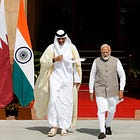Qatar’s $7.5 Billion Egyptian Stake in Gulf Rush to Secure Egypt's Stability
Qatar’s pledge suggest a strategic urgency to cement influence in Egypt.
Following Egyptian President Abdel Fattah el-Sisi’s visit to Doha on 14 April, the Egyptian presidency announced a $7.5 billion investment pledge from Qatar. While specifics remain undisclosed, this commitment underscores growing Gulf investment in the North African nation. Egypt’s strategic position as a transit hub along Gulf trade routes to Europe aligns with the region’s vision for a sustainable, cross-regional economic future. Qatar’s pledge reflects its ambition to secure a foothold in Egypt, reinforcing its role in a burgeoning intra-continental trade corridor. Hence, it seeks to support the Sisi’s administration stability. The Qatari step is also part of a recent wave of large investment deals with diversified global partners.
Gulf Rush to Secure Egypt
The scale and timing of Qatar’s pledge suggest a strategic urgency to cement influence in Egypt, a critical transit hub for Gulf trade. This move follows Qatar’s recent diplomatic balancing act, exemplified by its announcement of a strategic partnership with India and a 20-year helium supply deal with China within a single week. This is also evident in the new deal with Russia to establish a USD 2 billion fund for mutual investments, representing a striking challenge to Washington.
For Qatar, investing in Egypt is not only an attempt at diversifying its economic portfolio but a calculated move to counterbalance its Gulf rivals in the regioin. Saudi Arabia and the United Arab Emirates have made significant investments in Egypt, like the UAE’s $24 billion Ras El Hekma project. Considered Egypt’s largest-ever foreign investment, the deal -signed last year- marked the culmination of Abu Dhabi’s consistent investment strategy in the country, solidifying its position as by far the leading investor in Egypt. In response, Saudi jumped to make inroads in a post-Nasrallah Lebanon, as well as in Syria, where it was recently announced the Kingdom would pay off the country’s debt to the World Bank.
From Strained to Critical: Qatar’s Evolving Ties with Egypt
The Qatari-Egyptian relationship has been tumultuous over the past two decades, owing to ideological divides exacerbated by the Arab Spring. Prior to 2011, the Gulf nation was not a major investor in Egypt. Mohammed Morsi’s short-lived reign, backed by the Qatar-aligned Muslim Brotherhood, saw unprecedented Qatari investment, estimated at $8 billion during his single year in power, alongside an $18 billion five-year pledge. However, relations deteriorated sharply after Morsi’s ousting in 2013, culminating in Egypt’s participation in the 2017 Saudi-led blockade of Qatar.
The restoration of diplomatic ties in January 2021 marked a turning point. Since then, Qatari investments have steadily increased, with a $2 billion pledge in 2022 and actual investments reaching $619 million in 2023/24. The $7.5 billion pledge announced in 2025 not only builds on this trajectory but significantly accelerates the deepening of bilateral ties. Moreover, it offers a lifeline amid Cairo’s $400 billion external debt and a 2024 currency devaluation that fueled 30% inflation. Egyptian officials have emphasised economic cooperation as the cornerstone of this partnership, with Qatar’s expertise in liquefied natural gas (LNG) and Egypt’s advanced gas infrastructure and strategic geographic location making energy collaboration a no-brainer. Moreover, this alignment positions Qatar to strengthen its role in the Gulf’s race to supply energy to Europe. A portion of the funds may also be allocated to Gaza reconstruction efforts, aligning with Egypt and Qatar’s mediation roles in the Israel-Hamas conflict.




